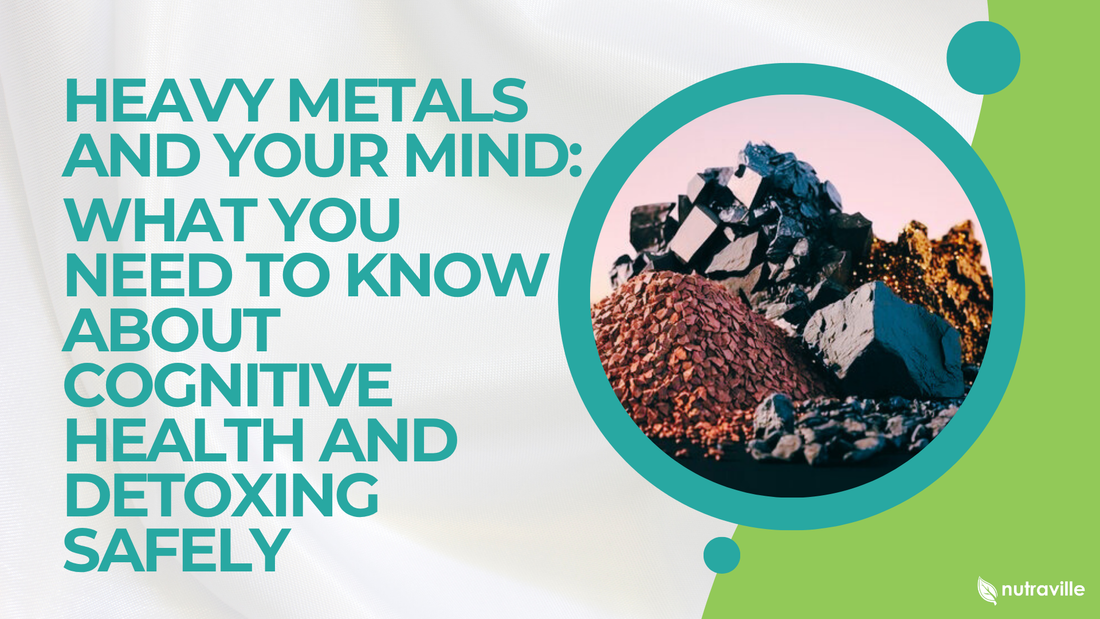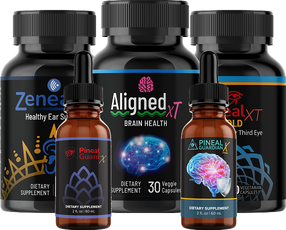Heavy Metals and Your Mind: What You Need to Know About Cognitive Health and Detoxing Safely

Isn’t it frustrating when you’re doing “all the right things” for your health, and yet you’re still feeling brain fog, forgetfulness, mood swings and fatigue?
Those things can be blamed on stress, maybe lack of sleep or just the inevitable decline of aging, right? Well, the thing is there’s another hidden culprit you need to know about: heavy metal exposure.
Metals like mercury, lead, aluminum, and cadmium can quietly accumulate in the body over time…and your brain, with its delicate balance of neurons and sensitive chemistry, is unfortunately one of their favorite targets.
But how do heavy metals affect the brain?
Your nervous system runs on electrical signals. Heavy metals are highly reactive, which means that they can disrupt these signals and interfere with neurotransmitters—the chemicals that regulate mood, memory, and focus.
These are the main offenders you should know about:
Mercury
Found in bigger fish like tuna and swordfish, old dental fillings, and industrial pollution. Mercury crosses the blood-brain barrier, where it binds to brain tissue and increases oxidative stress. High levels are linked to memory loss, anxiety, depression, and even Alzheimer’s disease.
Lead
Though it’s now banned in paint and gasoline, lead exposure still lingers in older homes, pipes, and soil. Lead damages the hippocampus, the brain’s memory center, and is associated with cognitive decline even at low doses.
Aluminum
Found in everyday cookware, deodorants, and some processed foods as well as in air and water from industrial emissions. Aluminum accumulates in brain tissue and has been studied for its potential role in Alzheimer’s disease, it disrupts your gut microbiome and contributes to brain fog.
Cadmium
Found in cigarette smoke, batteries, and contaminated water. Cadmium disrupts dopamine pathways, affecting motivation and mood.
Over time, all if these heavy metals contribute to neuroinflammation, oxidative stress, and accelerated brain aging.

Signs you May Have Heavy Metal Toxicity
Heavy metal overload doesn’t happen overnight, it’s a slow creep. Symptoms may include:
-
Brain fog and poor concentration
-
Short-term memory loss
-
Chronic fatigue
-
Mood swings, anxiety, or depression
-
Sleep disturbances
-
Tingling or numbness in extremities
If you’ve ruled out other causes, testing for heavy metals (through blood, urine, or hair analysis) may provide answers and kickstart you on the journey to safely detoxing from these heavy metals.

Safe Detox Strategies for Brain Health
Detoxing heavy metals requires caution, mobilizing toxins too quickly can do more harm than good. But with the right support, the good news is that your body can gradually clear them out.
1. Support Your Liver and Kidneys
Your detox organs do the heavy lifting. Load your plate with raw or lightly steamed cruciferous vegetables (broccoli, kale, Brussels sprouts), hydrate well, and include herbs like milk thistle or dandelion root to keep detox pathways open.
2. Add Natural Chelators
Certain foods help bind and carry metals out of the body:
-
Cilantro – shown to mobilize mercury and lead
-
Chlorella – binds heavy metals for safe excretion
-
Garlic and onions – rich in sulfur, which supports detox enzymes
3. Skin Care
Sauna therapy, especially infrared saunas, helps to remove metals through sweat. This is one of the safest, most effective ways to reduce toxic load. Pair it with dry-skin brushing in the mornings and exercise such as rebounding to really support your detox pathways through lymphatic release.
4. Protect and Repair the Brain
Antioxidants like vitamin C, alpha-lipoic acid, and glutathione combat oxidative stress caused by metals. Herbal allies like lion’s mane and bacopa also support memory and repair.
5. Consider Targeted Supplements
Formulas like Pineal Guardian combine antioxidants and neuroprotective compounds designed to reduce oxidative stress and support the brain’s natural detox pathways. This is especially important if you’re concerned about mercury exposure and memory decline.
The Final Word
Heavy metals may be invisible to us, but their impact on the brain is very real and very dangerous. By reducing exposure and gently supporting detox pathways, you can protect your memory, mood, and long-term cognitive health.
Think of it as spring cleaning for your mind, making room for sharper focus, clearer thinking, and a healthier future.
Drop a comment below with your favorite way to detox!





